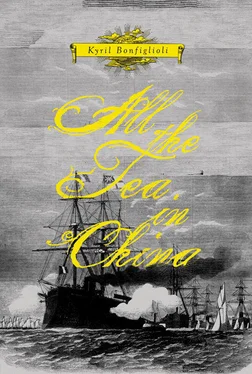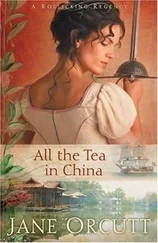Wonderfully savoury smells were drifting from the galley and after a dangerous romp through the rigging — which seemed to delight them although they took the same risks for pay every day and night of their lives — they put on clothes and soon the duty-man of each mess reported to the cook with a great mess-kid. That day’s dinner was the Doctor’s famous Kentucky Burgoo, invented by a Colonel in Kentucky long ago, made of unimaginable things. I tried a tin platter of it and found it very good indeed. It became my favourite and I still treasure the recipe, which I shall write out at the end of this book if I live so long.
While the men ate their dinner we officers took tea with Blanche. We were but a small company for Lubbock scorned such “poodle-faking”, the Second had the watch and the Captain was “busy with his charts” — we could hear him snoring in the inner sleeping-cabin. Peter left the room for a moment to fetch a book of verses which Blanche pretended to want.
“Blanche,” I said.
“You are to call me ‘Mrs Knatchbull’.”
“Blanche, you were watching the sailormen romping naked a little while ago, were you not?”
“How dare you?” she whispered furiously.
I merely smiled.
“How do you know?” she asked.
I continued to smile.
“Well,” she murmured, “if you had been me and they were girls, would you not have watched?”
I nodded vehemently.
“Well, then. But I asked you how you knew.”
“I did not know, but I know you, Blanche.” She blushed, furious again, or pretending to be so.
“Oh no you do not, Sir! Nor shall you, if that is what you think!”
“Yes I do — and shall,” I said laconically. She marched up so close to me that her breasts nearly touched my shirt; glared at me for a moment, then kicked me very hard just above the ankle. I smiled.
“What is the name of the coarse seaman with the long, absurd, ah, thing?” she asked.
“I do not know. Let us ask Lord Stevenage when he returns.”
“I hate you.”
Dinner for us officers, later that day, was sea pie. It is quite delicious. The proper sort, such as we had, was known as a “three-decker” because it was made of layers of salt junk (pork or beef), vegetables and fish, each separated by its own pie-crust. Thus one could deal with it seriatim as a primitive meal of three courses or, if one was a connoisseur and the pie made by a reliable cook, one could cut through all the strata and have all three things delightfully mingled upon one’s plate and palate. Each of the crusts, too, had its own peculiar flavour; the pungency of that which separated the fish from the meat was particularly prized although it tasted a little rank on first acquaintance.
(“Junk”, I should explain, really meant old ropes and such stuff so hardened with salt and tar that it was cut into lengths and sold — or saved — for picking into oakum, with which ships’ seams were caulked. Ships would often carry a quantity of it in the lazaretto to give occupation for prisoners and idle hands generally. This is why “marine-stores”, which dealt in such redundant things, came to be called “junk-shops” — and why “junk-shop” has come to be a contemptuous term for an establishment purveying fine antique porcelains. Salt pork, towards the end of its long life in the barrel, develops a curious appearance and texture which irresistibly reminds one of this pensioned-off cable: hence the opprobrious but affectionate name “salt junk”. “Irish Horse” and “King’s Own” were other names which do not need explanation, I think.)
After the sea-pie we were brought duff, for it was Sunday. The men, too, had been given duff — “dog in a blanket” they called it or, if without currants, “dog’s vomit”— and although it was but a dark heavy mess of flour and beef-fat boiled in the tail of a shirt they prized it greatly, for it was their Sabbath privilege. Indeed, when anointed with a syrup made of hot water and molasses it served very well to fill up the chinks of a healthy belly, especially after taking vigorous exercise.
That night, after reading a few pages of print, Peter and I agreed to take our bedding out onto the deck, for the night was warm and seductive. We settled by the taffrail, exactly at the end of the “lubber-line” or fore-and-aft axis of the ship, for there the rolling motion is least and so digestion least disturbed. I lay on my back, wondering at the sky.
It is hard to explain how different the sky is in the Tropics at night: it is never black but a kind of rich, velvet blue, like the groundcolour of a fine Ming jar, and the stars are not cold and remote but hot, fat and within reach of an outflung hand. Until you have seen it you cannot begin to understand. The tropic sea chuckled knowingly under the ship’s counter below us and, below us too, the rudder sometimes squeaked and grunted in its pintles as the quartermaster corrected his course. With a twist of the body and a straining of the neck I could see our wake streaming out behind and flashing with phosphorus, blue and green and silver fire. I was reminded of the sequined front of the gown of a plump lady singer I had once admired in Gatti’s Music Hall in Villiers Street, by Charing Cross: it moved me almost to tears.
Since these pages are intended for the eyes of grandchildren of varying degrees of innocence and — now that the St Elmo’s Fire of authorship is, I must confess, commencing to sear my breast — it seems to me that I must eschew describing the less genteel adventures which befell me from Finisterre to Gran Canaria, lest this relation might raise a blush upon the cheek of childish purity or, worse, cause a bookseller to feel that my work was not likely to be acceptable to Mr Mudie’s Circulating Library. Suffice it to say, then, that I learned a great deal during the passage but was not able to have my will of Mrs Knatchbull, who still stoutly resisted my attempts to call her “Blanche”.
Indeed, this would have been exquisitely dangerous — having my will of her, I mean — because the ship was small, as I have said, and her husband stalked incessantly about in the course of his duties and, at the most unpredictable times, would make it clear to her that she was to be ready for his husbanding in four and one half minutes. I thought I might never learn what had to be done in this four-and-one-half minute interim but you may be sure that my imagination ran riot. Yours, too, I suspect, would also have run the same riot, for she was most desirable and, by the time I am speaking of, would make a charming grimace at me when he gave her these orders in my presence. Sometimes she would raise her eyebrows a little while looking at me enigmatically. It was quite enervating.
Peter used to look at me strangely in those days, as though marvelling at my ill temper. Fortunately, there was the ever-present spiritual consolation of the Doctor’s food: who can dwell upon the evanescent delights of the female body (“sacca stercoris, sacca vermorum ”) when every few hours comes fresh and fresh some new delight to gladden the belly and fortify the animal tissues? I defy anyone to lie brooding over the bosom of his Captain’s wife when his own bosom is crammed with a breast of young lamb, boned and rolled and stuffed with forcemeat and rosemary.
So we sped southward; each one of us,I am sure, wrapt in his own preoccupation. I remember Las Palmas, the port of Gran Canaria, only because there I caught from a young person a tiresome little infestation which is of no interest and also because I bought a canary-bird which sang so indefatigably that I felt obliged, on my way back to the ship, to cool its ardour in sea-water. I did not mean it to die; I have felt unhappy about it ever since. It must have been frail, frail.
Читать дальше












